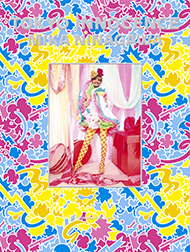- HOME >
- CATALOGUE
TOKYO INNOCENCE
2,800yen+tax
NINAGAWA Mika
Size/21.5cm×28.8cm
ISBN978-4-8381-0502-1
NINAGAWA Mika (1972- ) made her debut in Tokyo as a photographer in 1990s and has been actively
pursuing her work in a variety of exhibitions and publications. When her vivid and even violently
colored photographs are exhibited in the well-deliberated room, the setting becomes like a small theatre
that immediately grasps the viewers’ attention and emotions and makes them a big fan of her work.
She has held exhibitions both in small galleries and large museums, and all of her solo exhibitions have
attracted a large number of visitors. What attracts such a large number of fans to her photography?
One of the answers is that Ninagawa’s photography let one’s mind escape to another dimension and
makes one feel as if he or she were flowing in paradise. However, at the same time, a sweet dream also
includes dangerous poisons, like many excellent fantasies always involve the antithesis of pleasure and
fear. Ninagawa’s photography also expresses this “dual side.” This photo book collection, “TOKYO
INNOCENSE,” consists of many of this talented photographer’s work, showing the “Edge of Tokyo”
and “Extremes of Tokyo.” Tokyo is particularly unique in terms of its mixture of cultures where new
“hybrid” creations are continuously arising one after another, like a chain reaction. One representative
example is Cos-Play (dressing-up like anime characters) and Visual-kei (a style of disguising oneself
using varying levels of make-up, elaborate hair styles and flamboyant costumes). Both originated in
Tokyo and have been developed, or rather, been mutated to become another level of “Otaku” culture
(people with obsessive interests, commonly involved in anime and manga fandom). Today, they are no
longer “underground” but have been developed and accepted by and large in society via TV and Internet
as they are strongly connected to TV stars and pop culture. If there is a word to describe them, “Innocent
Playfulness” might be the one of the representative characteristics of Tokyo culture.

